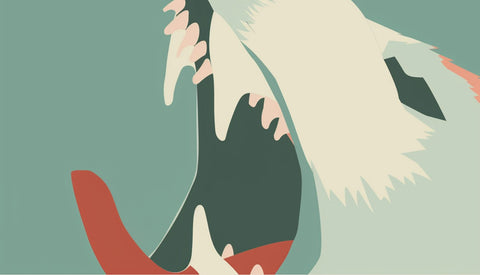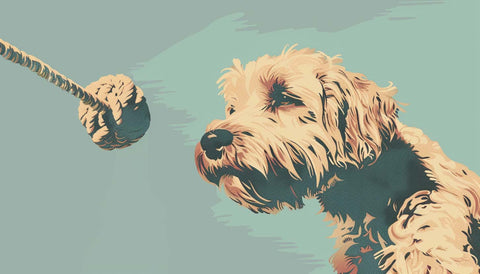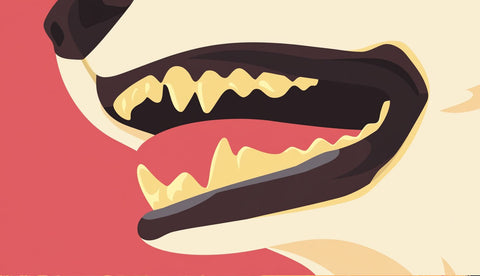Your dog's teeth are really important for their health. If their mouth isn't healthy, it can make them sick. Many dogs get dental problems, almost 8 out of 10 by the time they are three! But the good news is that proper dog teeth cleaning can stop this from happening.
Bad teeth aren't just a problem for your dog's mouth, they can make them unwell in other ways too.
So, how can we keep our dog's teeth clean and healthy? Let's learn more about what causes problems with their teeth in the first place!
How Do Dog Teeth Cleaning Help Prevent Problems?

Every time your dog gobbles down their food, bits of it stick to their teeth, forming a sticky film called plaque. This plaque can harden into tartar, which looks like a yellow or brown stain. Plaque and tartar are home to bacteria, and they are the real troublemakers. They attack the enamel on your dog's teeth, making them weaker and even damaging the gums and bone around the teeth.
The worst part is, tartar that gets under the gum line is like a secret hideout for bacteria. It's a place where even a regular toothbrush can't reach, and it gives the bacteria a chance to really do some damage to the roots of your dog's teeth.
To make matters worse, your dog's own immune system actually makes things worse! When their body sees these bacteria as invaders, it tries to fight back by causing inflammation in their mouth. This inflammation can further damage the gums and teeth.
Sadly, dental problems are quite common in dogs these days. This is partly because of the way we feed them. While kibble is good for dogs, it contains carbohydrates that act like sugars on their teeth. These carbohydrates are important for your dog's health, so changing their diet completely isn't the best solution.
It's also worth knowing that some dog breeds are more likely to get dental problems than others:
Small breeds like Yorkies, Poodles, and Maltese:
These small dogs sometimes have their baby teeth hanging around even after their adult teeth grow in. This can lead to overcrowding and uneven bites.
Collies:
Collies often have an overbite, which can make their teeth rub against each other and damage their gums.
Pugs:
Pugs and other breeds with flat faces (brachycephalic breeds) often have crowded teeth that make it easier for food to get stuck. They also have an uneven bite, called malocclusion.
Dachshunds:
A Dachshund's long, narrow mouth makes it easier for pockets to form in their gums, where bacteria can grow.
Boxers, Great Danes, Mastiffs, and Bulldogs:
These breeds often have thicker gums because of inflammation caused by plaque and tartar.
Warning Signs of Dental Disease in Dogs
You might be surprised to learn that more than 8 out of 10 dogs will develop dental problems before their third birthday. So, knowing the signs of dental problems is the first step in giving your dog the best dental care they deserve.
If you spot any of these warning signs, it's a good idea to contact your vet directly as they can help you create a proper dog teeth cleaning routine and provide the best advice and treatment. Don't wait until it's too late—early intervention can make a big difference.

#1 Trying to Scratch or Rub Their Mouth:
Dogs can't talk, but they're pretty good at communicating through body language. If you notice your dog pawing at their mouth, rubbing their muzzle, or chattering their teeth, it could be a sign that they're uncomfortable.
These actions could mean they're experiencing pain, irritation, or discomfort in their mouth due to dental problems.
Good oral hygiene, including regular dog teeth cleaning, can go a long way in preventing these issues.
#2 Bad Breath:
Does your dog have bad breath? While it's not always a sign of a problem, bad breath (or halitosis, as the vets call it) can be a warning sign that there's something going on with their teeth.
Sometimes, it's just from eating something a bit unusual, but often, bad breath is caused by a build-up of plaque. This plaque contains bacteria that produce smelly sulfur compounds. Not only is it unpleasant, but this bacteria can also lead to dental problems if it's not taken care of! This is why it's important to make dog teeth cleaning part of your pet's routine.
#3 Red or Inflamed Gums:
If your dog's gums are red, swollen, or bleeding, it's a sign that their dental disease is getting worse. Exactly like gingivitis in humans – it's painful and can make it hard for your dog to eat comfortably.
Left untreated, this inflammation can worsen and lead to tooth loss. That's why it's so important to catch these signs early and take action to protect your dog's oral health.
#4 Noticeable Yellow or Brown Stains on Your Dog's Teeth:
Your dog's teeth should be nice and white, if you see yellow or brown stains on their teeth, it means plaque and tartar have built up and need to be cleaned off.

To help your dog get that pearly white smile back, try the Pure and Natural Pet organic plaque & tartar removal dental paste! It's made with natural oils and mint extracts, so you can keep your dog's vital organs safe without harmful chemicals or preservatives. Our dental paste freshens breath, promotes healthy gums, fights plaque, and is free from pesticides, preservatives, and additives. It's just pure, natural goodness for your pet!
To help make dog teeth cleaning a breeze, brush your dog's teeth 2-3 times per week. Apply a pea-sized amount of gel to a toothbrush and gently brush their teeth and gums to remove plaque and tartar. With regular use, you'll see a big difference in your dog's smile!
#5 A Bump or Swelling Under Their Eye:
Dental disease in dogs can sometimes cause symptoms that go beyond just their mouth. For example, infections and broken teeth can lead to abscesses, causing swelling under the eyes.
#6 Eating Problems or Loss of Appetite:
We all know dogs love their food, so when they lose interest in mealtimes, it's a big red flag! If your pooch seems to be struggling to chew its food, favouring one side of its mouth, or just not as enthusiastic about eating as usual, it could be a sign that its dental problems are causing discomfort.
Remember, regular dog teeth cleaning can help prevent these problems and keep your dog's appetite healthy! If you're worried about your dog's eating habits, check in with your vet as soon as possible. They can help you get to the bottom of the issue and create a plan for keeping those pearly whites healthy.
Why Dog Teeth Cleaning It's So Important?
The dangers of untreated dental disease
It's not just about bad breath! If left untreated, dental disease in dogs can affect their entire body, leading to serious health issues, including:
- Damage to the heart, kidneys, and liver: Dental disease can put stress on these vital organs.
- Chronic sinusitis: This can cause inflammation in the sinuses.
- Osteomyelitis (bone infection): Since the roots of teeth are attached to the jawbone, infection from the mouth can spread to the bone.
- Jaw fractures: Untreated dental problems can weaken the jawbone.
- Septicemia (blood infection): This can be life-threatening.
A simple routine of dog teeth cleaning can keep your pooch happy and healthy for years to come.
Preventing Dental Problems in Dogs
Dental disease is 100% preventable with consistent at-home care and regular check-ups with your vet for professional cleaning.
Dog Teeth Cleaning at Home:
You can do a lot to help prevent dental disease in your dog right at home! The most effective way to remove plaque and tartar is by brushing your dog's teeth.
You can use Pure and Natural Pet eco-friendly bamboo brush. It's made with dental-grade ergonomic nylon bristles from recyclable material, so it's good for your dog and good for the planet! And, of course, you'll need an organic plaque & tartar removal dental paste. It's made with natural oils and mint extracts, so you can keep your dog's vital organs safe without harmful chemicals or preservatives.

Gently brush the outer surfaces of their teeth in a rhythmic motion, just like you would your own teeth. Don't worry too much about the inner surfaces – their tongue does a pretty good job of cleaning those!
While dog teeth cleaning is the gold standard for home care, we know it's not always easy. Some dogs just aren't fans of having their teeth brushed! But don't worry, there are other at-home options to keep your dog's smile healthy:
Try our Wild Boar Skin, It's all natural and helps keep their teeth clean by getting rid of plaque and tartar. It's good for dogs of all sizes and breeds. Smaller dogs might take a bit longer to finish it, but they'll still enjoy it as much as the bigger ones!

Also:
- Oral Care Sprays and Rinses
- Dental Water Supplements
- Veterinarian-Recommended Dental Food
Final Thoughts,
You want to keep your dog's smile bright, right? Don't wait until it's too late! Make sure you brush those pearly whites regularly - that means regular dog teeth cleaning - schedule those vet checkups and treat your pup to some dental-friendly goodies. You'll be glad you did.
And while you're here, be sure to check out our range of eco-friendly pet essentials, trusted by UK pet owners and carefully chosen by experts to keep your dog happy and healthy for the long run.


